At first she could not make anything out because the windows were shuttered.
However, after a few moments she began to see that the floor was covered with clotted blood, in which were reflected the bodies of several dead women who were ranged against the walls of the closet
– these were all Blue Beard’s previous wives, married and murdered by him one after another. She almost died with fear, and the key, which she had pulled out of the lock, fell out of
her hand.
After a little while, having recovered her senses somewhat, she picked up the key, locked the door, and went upstairs to her chamber to recover, but she was so frightened that she was unable to
collect herself. Seeing that the key of the closet was stained with blood, she tried two or three times to wipe it away, but the blood would not come off. In vain did she wash it – she even
rubbed it with soap and sand – but the blood still remained, for the key was enchanted, and she could never make it quite clean; when the blood was gone from one side it appeared again on the
other.
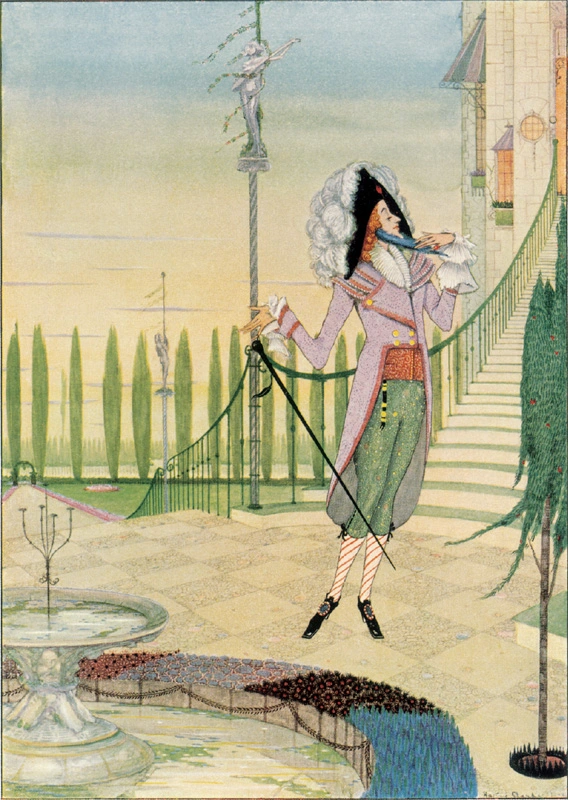
“THIS MAN HAD THE MISFORTUNE TO HAVE A BLUE BEARD”
Blue Beard returned from his journey that same evening; he said that while on the road he had received letters informing him that his business had been concluded to his advantage and that he was
no longer needed. His wife did all she could to convince him that she was glad about his speedy return. The next morning he asked her for the keys, which she gave him, but with such a trembling
hand that he easily guessed what had happened.
“What?” he asked, “Is the key of my closet not among the rest?”
“I must certainly,” she replied, “have left it upstairs on the table.”
“Then go upstairs and bring it to me at once,” said Blue Beard.
After putting him off several times, she was forced to bring him the key. Blue Beard, having examined it very carefully, said to his wife, “How did this blood come to be upon the
key?”
“I do not know,” cried the poor woman, who was paler than death itself.
“You do not know,” replied Blue Beard. “I know very well that you were determined to go into the closet, were you not? Very well, Madam, you will go in, and you will take your
place among the ladies you saw there.”
At this, she threw herself at her husband’s feet and begged his pardon with all the signs of true repentance for her disobedience. She was so beautiful and sorrowful that she would have
melted a rock, but Blue Beard had a heart that was harder than any rock.
“You must die, Madam,” he said, “and soon.”
“Since I must die,” she answered, looking at him with eyes filled with tears, “give me a little time to say my prayers.”
“I will give you,” replied Blue Beard, “half a quarter of an hour, but not one moment more.”
When she was alone she called out to her sister, and said to her,
“Sister Anne” (for that was her name), “go up, I beg you, to the top of the tower and see if my brothers are coming. They promised me that they would come today, and if you see
them, give them a sign to make haste.”
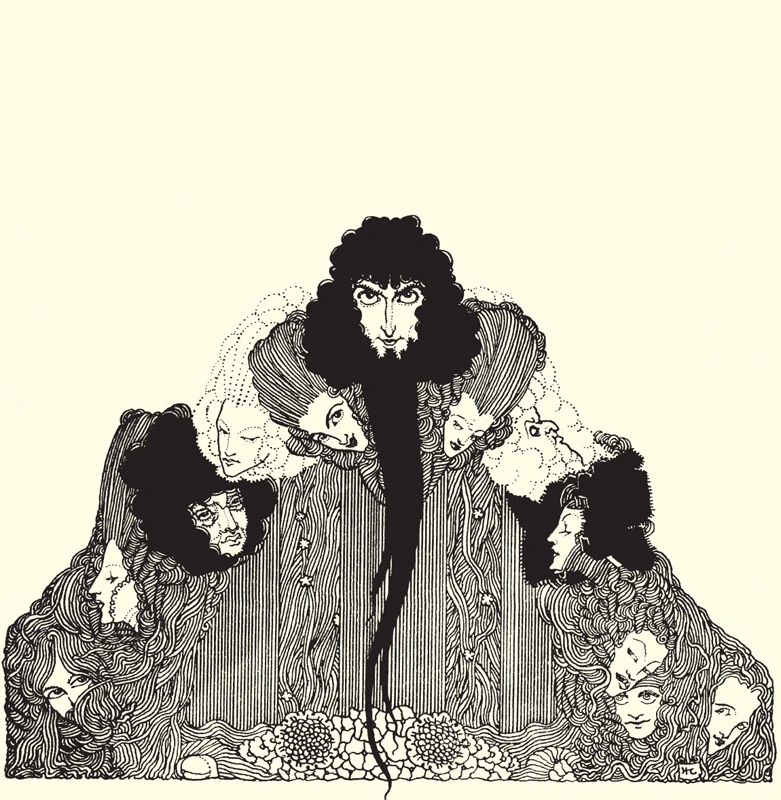
Her sister went up to the top of the tower, and the poor afflicted wife cried out from time to time, “Anne, sister Anne, do you see anyone coming?”
And her sister replied, “I see nothing but the sun, which makes a haze, and the grass growing green.”
In the meantime, Blue Beard, holding a great scimitar in his hand, shouted out as loudly as he could to his wife, “Come down instantly, or I shall come up to you!”
“One moment longer, if you please,” said his wife, and then she cried out very softly, “Anne, sister Anne, do you see anybody coming?”
“I see nothing but the sun, which makes a haze, and the grass growing green.”
“Come down quickly,” cried Blue Beard, “or I will come up to you!”
“I am coming,” his wife replied, and then she cried, “Anne, sister Anne, do you see anyone coming?”
“I see,” replied her sister, “a great cloud of dust coming this way.”
“Are they my brothers?”
“Alas! No, my dear sister, I see a flock of sheep.”
“Will you not come down?” cried Blue Beard.
“One moment longer,” said his wife, and then she cried out,
“Anne, sister Anne, do you see nobody coming?”
“I see,” replied Anne, “two horsemen coming, but they are still a long way off. God be praised,” she added, “they are my brothers. I am beckoning to them as well as
I can, for them to make haste.”
Then Blue Beard bawled so loudly that he made the whole house shake. The distressed wife came down and threw herself at his feet, in tears, with her hair down around her shoulders.
“Nothing will do you any good,” said Blue Beard, “you must die.” Then, taking hold of her hair with one hand, and lifting up his scimitar with the other, he was about to
take off her head.
The poor lady, turning around to face him, and looking at him with dying eyes, asked him to allow her one little moment to collect herself.
“No, no,” he said, “commend yourself to God,” and he was just ready to strike.
At that very moment there was such a loud knocking at the gate that Blue Beard suddenly stopped in mid swing. The gate was opened and two horsemen entered, who drew their swords and ran straight
over to Blue Beard. He knew them to be his wife’s brothers, one a dragoon, the other a musketeer, and he ran away immediately to save himself, but the two brothers ran after him so quickly
that they caught him before he could get to the steps of the porch. They ran their swords through his body and left him dead.
The poor wife was almost dead with fright, and didn’t have enough strength to rise and welcome her brothers.
Blue Beard had no heirs, so his wife became mistress of all his estate. She made use of one portion of it to marry her sister Anne to a young gentleman who had loved her for a long time; another
portion to buy captains’ commissions for her two brothers; and the rest to marry herself to a worthy gentleman, who made her forget the dreadful time she had spent with Blue Beard.
THE MORAL
O curiosity, thou mortal bane!
Spite of thy charms, thou causest often pain
And sore regret, of which we daily find
A thousand instances attend mankind:
For thou – O may it not displease the fair –
A fleeting pleasure art, but lasting care.
And always proves, alas! too dear the prize,
Which, in the moment of possession, dies.
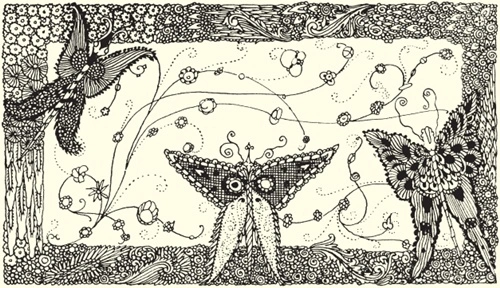
ANOTHER
A very little share of common sense,
And knowledge of the world will soon evince
That this story is of time long pass’d;
No husbands now such panic terrors cast;
Nor weakly, with a vain despotic hand,
Imperious, what’s impossible, command:
And be they discontented, or the fire
Of wicked jealousy their hearts inspire,
They softly sing; and of whatever hue
Their beards may chance to be, or black or blue,
Grizeld, or russet, it is hard to say
Which of the two, the man or wife, bears sway.
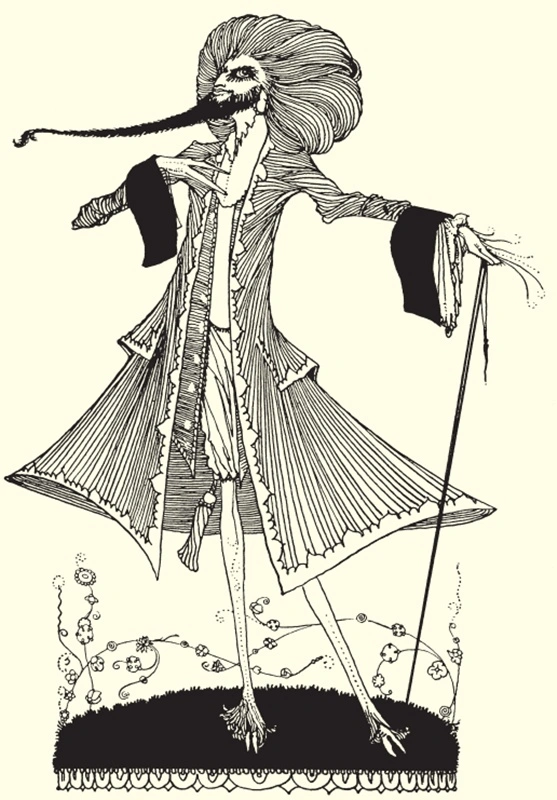
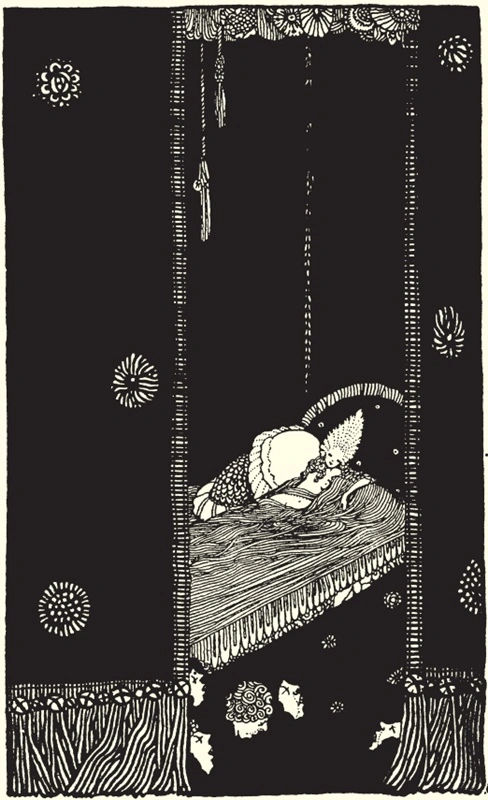
THE SLEEPING BEAUTY
Once upon a time there were a king and queen who were very sad that they had no children, so sad that it cannot be expressed. They visited all the
holy wells in the world; vows and pilgrimages and all other means and ways were tried, but nothing worked. At last, however, the queen became pregnant and gave birth to a daughter. There was a very
fine christening, and the princess had as godmothers all the fairies they could find in the whole kingdom (they found seven), so that each one of them might give her a gift, as was the custom of
fairies in those days, and that by this means the princess might have all the perfections that could be imagined.
After the christening ceremonies were over, everyone returned to the king’s palace, where a huge feast had been prepared for the fairies. At each fairy’s place at the table there was
a place setting with a case of gleaming gold, which contained a spoon, knife and fork, all made of pure gold set with diamonds and rubies. Just as they were all sitting down to eat they saw coming
into the hall a very old fairy who had not been invited, because it was more than 50 years since she had been seen, and she was believed to be either dead or enchanted. The king ordered a place
setting for her, but he could not give her a golden case such as had been provided for the others, because only seven had been made, for each of the seven fairies. The old fairy believed that she
had been slighted, and muttered a threat through her teeth. One of the young fairies sitting near her overheard her grumbling. Thinking that the old fairy might give the little princess some
unlucky gift, the young fairy went and hid herself behind some hangings as soon as they rose from the table, so that she might speak last and repair, as much as possible, any evil that the old
fairy might intend to do.
In the meantime, all the fairies began to give their gifts to the princess. The gift of the youngest fairy was that she should be the most beautiful person in the world; the next fairy gave her
the gift of the intelligence of an angel; the third fairy decreed that she would be wonderfully graceful in everything she did; the fourth fairy’s gift was that she should dance with
perfection; the fifth fairy gave her the gift of a singing voice like a nightingale; and the sixth fairy’s gift was the ability to play all kinds of music flawlessly.
The old fairy’s turn came next, and, with a head shaking more with spite than with age, she said that the princess would cut her hand on a spindle, and would die of the wound. This
terrible gift made everyone tremble, and they all began to weep.
At that very moment, the young fairy came out from her hiding place behind the hangings.
“Be reassured, Your Majesties,” she said, “Your daughter will not die of this disaster. It is true that I have no power to undo entirely what the old fairy has done. The
princess will indeed cut her hand on a spindle, but instead of dying, she will fall into a deep sleep, which will last 100 years.
1 comment